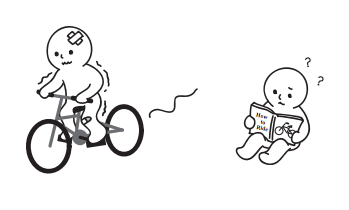Embodied Skills/OG
Jump to navigation
Jump to search
Continue practicing until you acquire the desired skills.
***
▼In this context
▼Therefore
| Embodied Skills | |
| Contributors | Takashi Iba, Mami Sakamoto |
|---|---|
| Last modification | May 17, 2017 |
| Source | Iba & Sakamoto (2011)[1]; Iba (2010)[2] |
| Pattern formats | OPR Alexandrian |
| Usability | |
| Learning domain | |
| Stakeholders | |
Also Known As: Embodied Learning (Embodied Learning)
“Practice makes perfect.” — Proverb
You want to acquire a skill.
It is not enough to memorize the “how to.”
- • Learning from experience is easier to remember than rote memorization.
- • Skills can be used unconsciously.
- • It is hard to verbalize a skill that has been acquired through experience.
Continue practicing a skill again and again until you can use it unconsciously.
- • First of all, try to use new skill and acquire a sense of it.
- • And then, study the skill and understand how it works.
- • Finally, keep in practice until you master it. Leaving the trace of learning as Tangible Piles (Tangible Piles) is a good way to maintain your motivation.
References
- ↑ Iba, T., & Sakamoto, M. (2011). Learning patterns III: a pattern language for creative learning. In Proceedings of the 18th Conference on Pattern Languages of Programs (PLoP 2011) (p. 29). New York:ACM.
- ↑ Patlet mentioned in Iba, T. (2010). Designing a Pattern Language for Creative Learners.
